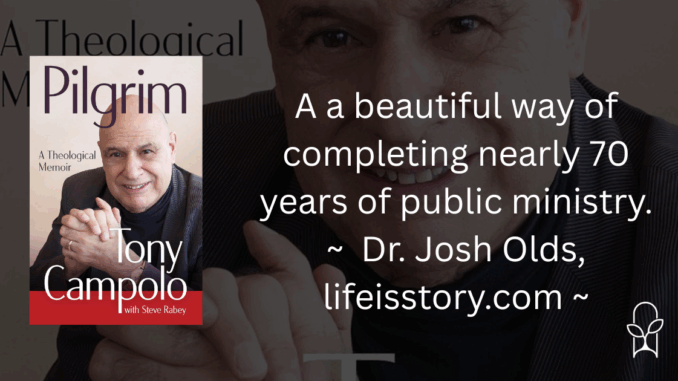
Published by Eerdmans on April 25, 2025
Genres: Non-Fiction, Biography, Memoir
Buy on Amazon
Goodreads

Follow the faith journey of Tony Campolo, one of the most influential figures in modern evangelical Christianity
Millions of Christians know Tony Campolo as a popular speaker, bestselling author, parachurch leader, pastor, and counselor to a US president. But few know his personal faith journey—how throughout his life, existential encounters and unexplored ideas compelled him to continually reexamine and reform his theology.
As a child, Campolo saw how his parents and the various churches he attended embraced different approaches to faith. Growing up, he wrestled with questions about racism, worldliness, and faith and science. He would go on to write and speak about war and peace, feminism, capitalism, religion and politics, nationalism, homosexuality, and the religious right. Pilgrim: A Theological Memoir traces the evolution of Campolo’s theology as he matured as a believer, scholar, and evangelical leader who continually sought to engage thoughtfully with the sociocultural challenges of his time and to encourage fellow believers to do the same.
I received a copy of Pilgrim: A Theological Memoir about a week before I made an international move from the US to Australia and I was left in a quandary: Do I pack this book with the rest of my library to be sent via shipping container and meander across the Pacific for five months visiting every port before arriving at my new home or do I try to stretch the laws of physics and find a place for it in my already full-to-bursting suitcase? The answer was obvious. It went on the plane with me.
While I’ve never met Campolo nor read many of his books – he had mostly retired by the time I came around to be part of the “evangelical Left” – his legacy through those he taught filtered down to me and has made an indelible impact in my life and ministry. Tony Campolo’s ministry would grow into the foundation of the so-called “evangelical Left.” With a commitment to both evangelical theology and progressive social ethics, Campolo found himself increasingly ostracised within his faith tradition while also forging his own successful path forward. And when I found myself – a child of evangelicalism – finding my faith tradition’s relationship with social justice to be appalling, it was Campolo and others like him that showed me a pathway forward. Because Campolo had led the way (along with leaders like Ron Sider and Jim Wallis), a whole new generation of evangelicals had a pathway forward to deconstruct from the toxic religion of they’d been a part of and join a community whose theology and sociology aligned.
But Campolo’s theology is one of becoming. He didn’t always believe what he came to believe. He didn’t always practice what he would eventually practice and preach. Pilgrim is a great name of the book. Campolo recounts his wandering journey in what he terms a theological memoir. The focus in on his beliefs, his practices, and the impact of his ministry. With candor and honesty, Campolo reflects on how he came to change some of his theological positions, most notably on homosexuality. He writes about being the focus of the last great “heresy trial,” where he was accused of heresy for saying that “Jesus is actually present in each other person.” He talks about his career as a professor and how his training in sociology affected his outlook on theology. He discusses his family life and how they were affected by his ministry.
For those who aren’t familiar with Campolo’s story, Pilgrim is a great surface-level reflection of nearly 90 years of life and 70 years of ministry. There are points where I wish it had gone deeper, particularly the last quarter of the book which sometimes feels like it’s just giving chronological summaries of Campolo’s books. But with such a broad scope of life, there’s only so much time to devote to each section. In all, I felt that as the both drew closer to the present day, there was less reflection on the events of Campolo’s life and more a straightforward retelling of Campolo’s life – less introspection, more exposition – and that felt like a bit of a letdown.
Nonetheless, Pilgrim is a beautiful way of completing nearly 70 years of public ministry. It is Campolo’s last effort to speak to the masses and while he retreads a lot of old ground, that’s what the “old, old story” is. The strength of this book is its story of becoming, of how even after he had achieved relative fame and success, he continued to grow and mature in his theology and spoke openly about that even to the detriment of his career. His life, embodied in this memoir, stands an example from the great cloud of witnesses to guide us as we run our own races set before us.
